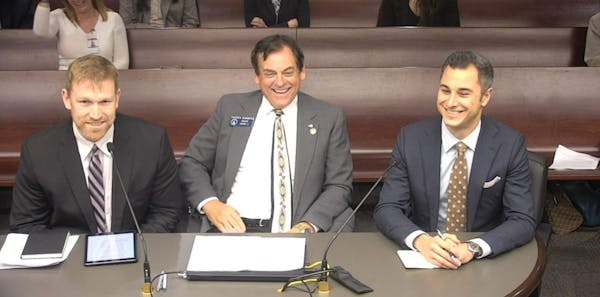Cicero Institute July 2022 Update
| Dear Friends, Supporters, and Allies, The past quarter has been a time of upheaval in the world, following on an unusual two years. The challenges faced by Americans remind us of the critical importance of public policy in our lives and why we must fight hard for policies that work. We founded the Cicero Institute because our country is not applying sound principles and innovation to many of its most pressing challenges. I worry that if we don’t solve these problems, we may lose our system, and with it the greatest light of liberty and prosperity the world has known. Fortunately, in just a few short years we’ve partnered with state leaders to achieve dozens of legislative wins—including the recent exciting victories below, which will have huge implications for policy in the United States. We are just getting started, and we’re so grateful for your continued partnership. The Cicero Institute is based on a simple idea: that the American tradition of a free, democratic republic with checks and balances on government works. Applied properly, liberty means that everyone is held accountable for their actions, and that over time, good ideas get rewarded and bad ones discarded, enabling progress in every area of society. Cicero brings the best parts of that tradition into government itself, by ensuring that government is transparent and accountable, and that successful experiments — such as how to run a prison to lower recidivism, or a vocational school or training program to create more high-paying graduates — get rewarded and shared. Without this approach, overly-bureaucratic and dysfunctional parts of our society will spread, misery will increase, and decadence and cynicism will reign. But an accountable government that harnesses the principles of a free society will lift up the lives of millions and protect the blessings of liberty for generations to come. |
| Thanks to your support, this was another triumphant legislative session for our policy solutions and our team. |
| In Missouri, I’m proud to say that Cicero Action — our 501(c)(4) lobbying arm — worked to frame and enact the strongest homelessness law on the books in the United States. HB 1606 passed with bipartisan support in both legislative chambers and was signed by the Governor. The reform gets cities to move homeless individuals off the streets, establishes pay-for-performance standards for localities and nonprofits, and cuts off funding for failed approaches to getting these individuals the help they need. Legislators in Missouri have taken a brave stand in the face of immense pressure from the homeless-industrial-complex. The new policy will be beneficial for both the vulnerable homeless and the taxpayers. Cicero’s model legislation on homelessness is now serving as a baseline for reform for legislators across the country, a fact that even our critics now recognize. In just two legislative sessions, the Cicero Institute has become the premier policy organization working on this issue. To date, Missouri, Tennessee, Texas, and Utah have enacted parts of our model, and bills in Arizona, Georgia, and Wisconsin made further progress through legislative committees and chambers this year. |
 |
| Cicero’s Judge Glock and Jared Meyer testified in support of Georgia Senator Carden Summers’ homelessness bill. |
| We’re optimistic about getting these reforms over the finish line next year as state legislators learn more about how cities are importing failed California homelessness policies. Our recent partnership with PragerU on a short documentary on the failures existing homelessness solutions has now amassed millions of views. In Florida, Governor Ron DeSantis signed SB 752, a comprehensive reform to the state’s parole and probation system. In that bill, Cicero Action worked to successfully include our language on earned time credits for those who work and gain career skills. Utah also enacted a Cicero Action bill establishing an innovative funding model for its probation program: it will reward local offices for getting more probationers into full-time jobs. Our public safety policy manager Devon Kurtz wrote about both bills here. With the country’s attention focused on major national issues like inflation and the economy, we’re laser-focused on the issues that set Cicero apart, and on which we’re able to lead. It has been a remarkable few months on these key issues. With legislators around the country now preparing for the 2022 midterm elections and 2023 legislative sessions, our team is digging in on our research and strategy. We’re focusing on our core issues of healthcare, homelessness, higher education, and public safety, and looking ahead to 2023, when the Texas legislature will return for its biennial regular session. We are doubling down on our mission to pursue transformational policy changes at the state level, and will continue partnering and exploring ways to educate the public by producing products that demonstrate the positive effects of liberty and effective governance. This work is made possible by your support and partnership. Our effective, nonpartisan solutions are needed now more than ever. We are fighting on the side of competence, common sense, and our shared values to preserve the American system. |
| I hope you will join me in lifting up the lives of millions of our fellow citizens and investing in the future of our free society. |
| With great anticipation of future victories, Joe Lonsdale Founder and Chairman, The Cicero Institute |
| C I C E R O I N T H E P R E S S US Senator Ben Sasse (R-NE) cited Cicero education research in his piece on reforming higher ed in The Atlantic. Senior Director of Policy and Research Judge Glock and Cicero Action Executive Director Jared Meyer both appeared on American Optimist. With discussion abounding about so-called “Special Districts” like the former Reedy Creek Improvement District, home to Walt Disney World, Judge Glock penned a piece in the Wall Street Journal explaining how these districts avoid accountability. Judge Glock wrote a long-form “Empire of Fees” article in City Journal on the rise of government charges. |


Supreme Court rightly lets communities choose how to respond to homelessness